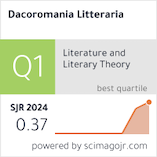7 |
2020
The subgenres of the Romanian novel: imports, backdrop, hybridizations
Dossier coordonné par / Edited by Alex Goldiș, Cosmin Borza

ISSN–L 2360 – 5189
[Text integral]
As Margaret Cohen broadly argues in her volume The Sentimental Education of the Novel, it has been common for modern literary theorists and historians to “doubt” the analytic relevance and the conceptual functionality of the literary genre. Cohen relies on seminal studies like Fredric Jamesonʼs The Political Unconscious: Narrative as a Socially Symbolic Act and Jean-Marie Schaefferʼs Quʼest-ce quʼun genre littéraire?, in order to point out that the literary genre was given a “coup de grâce” by “the deconstructive strain of poststructuralism, with its negative notion of textuality”. Cohen highlights through the whole range of criticism the persistence of essentialist assumptions about “internal forms” or “deep structures” which were presumed to naturally emerge among groups of literary texts.
This state of matters should explain, at least to some extent, the strong reluctance of Romanian critics, or even their manifest refusal to address the (sub)genre systems/categories of the novel. Most often than not, they preferred instead to assign a given novel with canonical value at the extent that it transgressed the confines of one or several subgenres. To this day, Romanian criticism still lacks a conceptual “encyclopedia” of the novel, be it original or translated. Moreover, local lexicographical projects dedicated to literary concepts and ideas usually avoid to define subgenres, and debates concerning the formal structures of the novel are usually led in vague, speculative terms, with little concern for theoretical definition.
Relying on such revised approaches and methodological inquiries as Margaret Cohen’s analysis of the sentimental novel, Franco Moretti’s study of the Bildungsroman, Fredric Jameson’s account of the romance, or Nancy Armstrong’s overview of the domestic novel, which highlight precisely the historicity of the genre’s forms, the thematical issue of the journal Dacoromania litteraria develops a reflection on the novelistic (sub)genres in Romanian literary history while focusing on establishing a series of their possible taxonomies, definitions, internal histories, influential models, local variants etc. All the articles are engaged in the debate on the multitude of novelistic forms within the Romanian literary space, on the cultural codes thereby set in motion, as well as on the historical forces that give them a voice and transform them into a reflection of society.
Les sous-genres en tant que « genres mondiaux » / Subgenres as “World Genres”
Distant Reading the Social Novel in Romania. Theoretical and Taxonomical Challenges / 10
[Abstract / Rezumat] [Full Text]
The Position of the Decadent Novel within Romanian Fin-de-siècle Literature / 22
[Abstract / Rezumat] [Full Text]
The Socialist Realist Novel in Romania between 1948 and 1955. Novelistic Genres and Subgenres / 56
[Abstract / Rezumat] [Full Text]
La diffusion des sous-genres populaires / The Diffusion of Popular Subgenres
Formes régionales, débats locaux / Regional Forms, Local Debates
Bucura Dumbravăʼs Outlaw/ Hajduk Novels / 154
[Abstract / Rezumat] [Full Text]
Political Fiction or Fiction about Politics. How to Operationalize a Fluid Genre in the Interwar Romanian Literature / 164
[Abstract / Rezumat] [Full Text]
Documents
Comptes rendus / Book Reviews
From Paris to Tlön. Surrealism as World Literature, New York – London, Bloomsbury Academic, 2018 (Teona Farmatu) / 221
Ruralism and Literature in Romania, Berlin, Peter Lang, 2019 (Ionucu Pop) / 223


